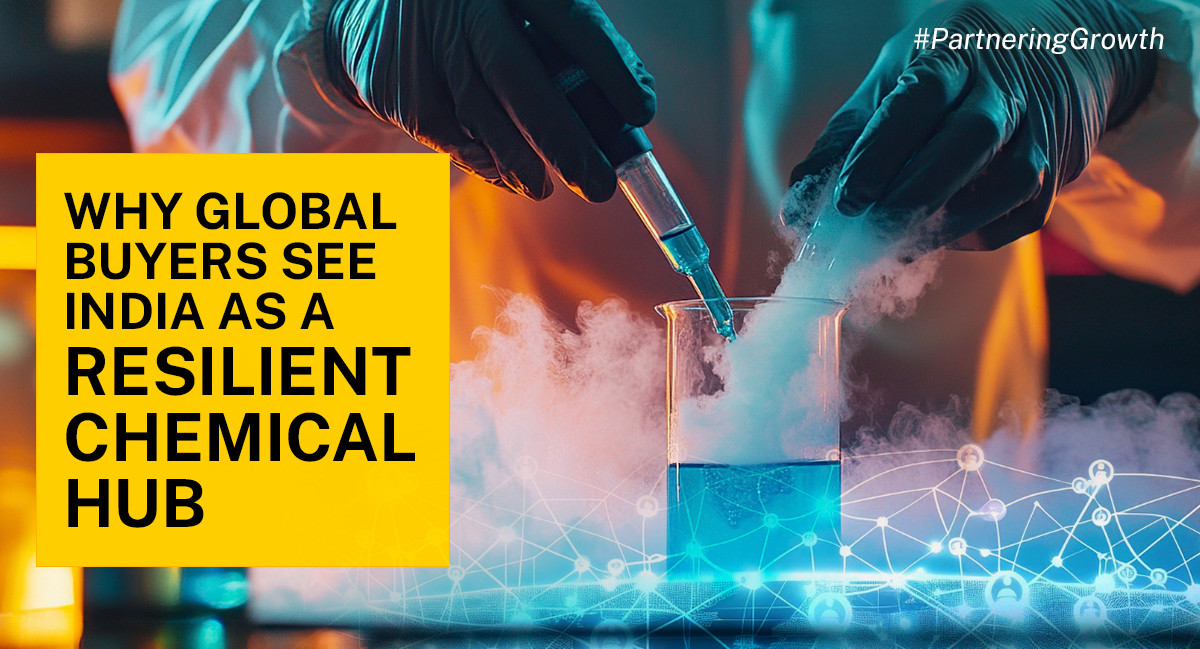


In today’s interconnected world, supply chains are only as strong as their weakest link. The pandemic, geopolitical tensions, and rising environmental expectations have made global buyers rethink where and how they source their chemicals. Increasingly, their attention is shifting toward India, not just as a low-cost alternative, but as a resilient, reliable, and forward-looking chemical hub. With chemicals and allied products exports reaching a record ₹9.28 lakh crore (US$108.59 billion) during FY 2025, India is emerging as the key player in the global chemical supply chain.
The ESG Advantage
One of the key factors driving this shift is India’s growing focus on sustainability and compliance. Global buyers are under pressure to meet environmental, social, and governance (ESG) standards in their supply chains. Indian chemical manufacturers are increasingly aligning with international compliance standards such as REACH (EU), US chemical safety norms, and Japan’s regulations.
Investments in green chemistry, cleaner production technologies, and sustainability initiatives are differentiating India as a compliant hub. For buyers, this means they can meet their own ESG goals while tapping into a cost-competitive market.
Compliance as a Competitive Edge
For decades, compliance was often seen as a hurdle in manufacturing. Today, it’s become a competitive advantage. India’s chemical industry is increasingly aligning with international regulations such as REACH (Registration, Evaluation, Authorisation and Restriction of Chemicals) in the EU or the stricter safety frameworks followed in the US and Japan. By investing in better safety practices and quality certifications, Indian companies are building trust and positioning themselves as reliable partners for multinational corporations.
Resilience in a Shifting Global Landscape
Resilience has become the buzzword in supply chains post-2020. Disruptions in China due to strict lockdowns, coupled with rising geopolitical tensions, forced global buyers to diversify their sourcing. India has emerged as a natural choice, offering scale, diversity of chemical production, and growing domestic demand that stabilises the industry even during global downturns. This resilience gives buyers confidence that their supply chains won’t collapse when shocks occur elsewhere.
The supply chain resilience is supported by India’s diversified chemical manufacturing base, growing domestic demand, and government policies promoting production-linked incentives (PLI) in chemicals and petrochemicals. Foreign Direct Investment (FDI) inflows in the chemicals sector (excluding fertilisers) reached approximately ₹1,42,647 crore (around US$23.2 billion) in FY 2024-25. These investments enhance capacity, reduce dependency on imports (especially China), and improve supply chain security.
Examples of India’s Growing Role
We see this shift across specialty chemicals, agrochemicals, and pharmaceuticals, where India is steadily gaining ground. For instance, in specialty chemicals, global buyers are looking at India not just for volume but for innovation and R&D capabilities. In agrochemicals, India is filling gaps left by other supply markets, offering both competitiveness and reliability. In pharmaceuticals, where compliance and quality are paramount, India has already established itself as the “pharmacy of the world,” setting a precedent that is now extending into broader chemical segments.
Looking Ahead
The opportunity for India lies in building on these strengths. By continuing to invest in sustainable production, expanding R&D, and deepening compliance with international standards, India can move from being a fallback option to becoming a first-choice partner in global chemical supply chains. For buyers, this isn’t just about cost; it’s about trust, resilience, and a shared commitment to sustainable growth.